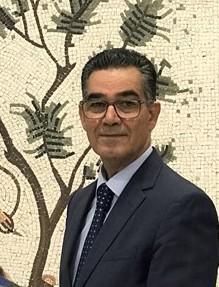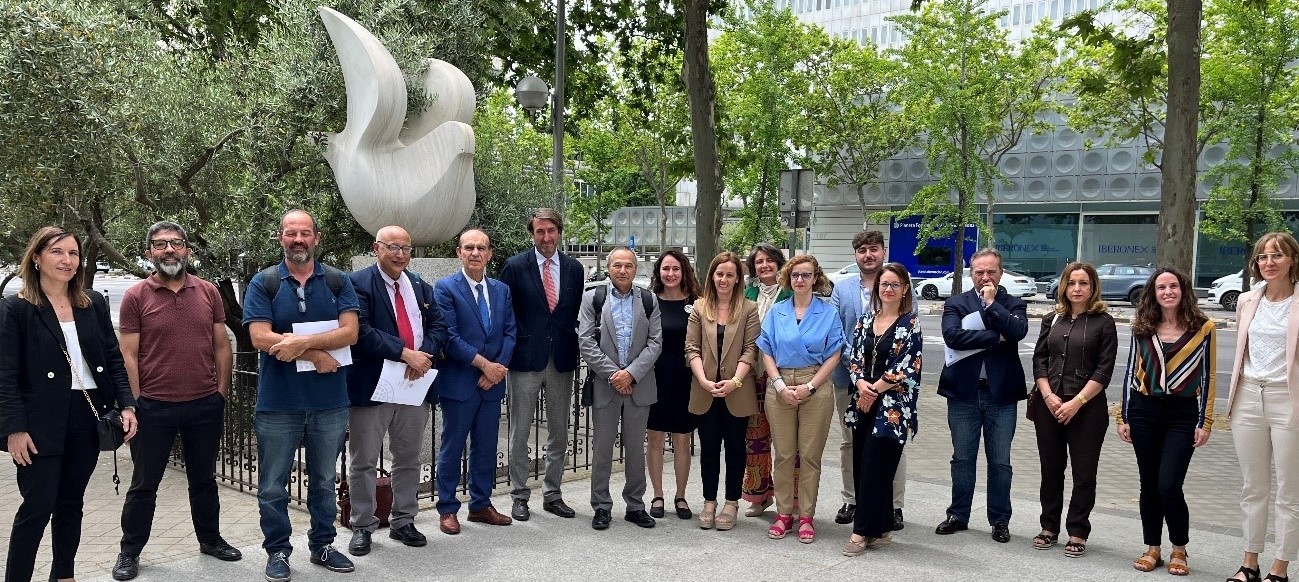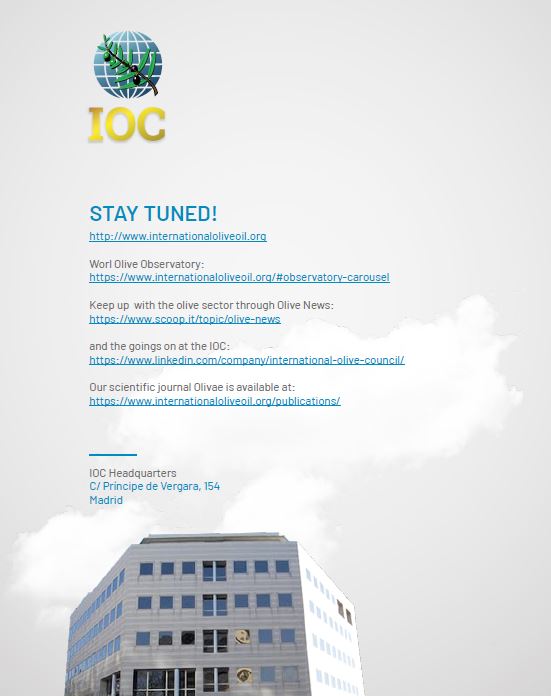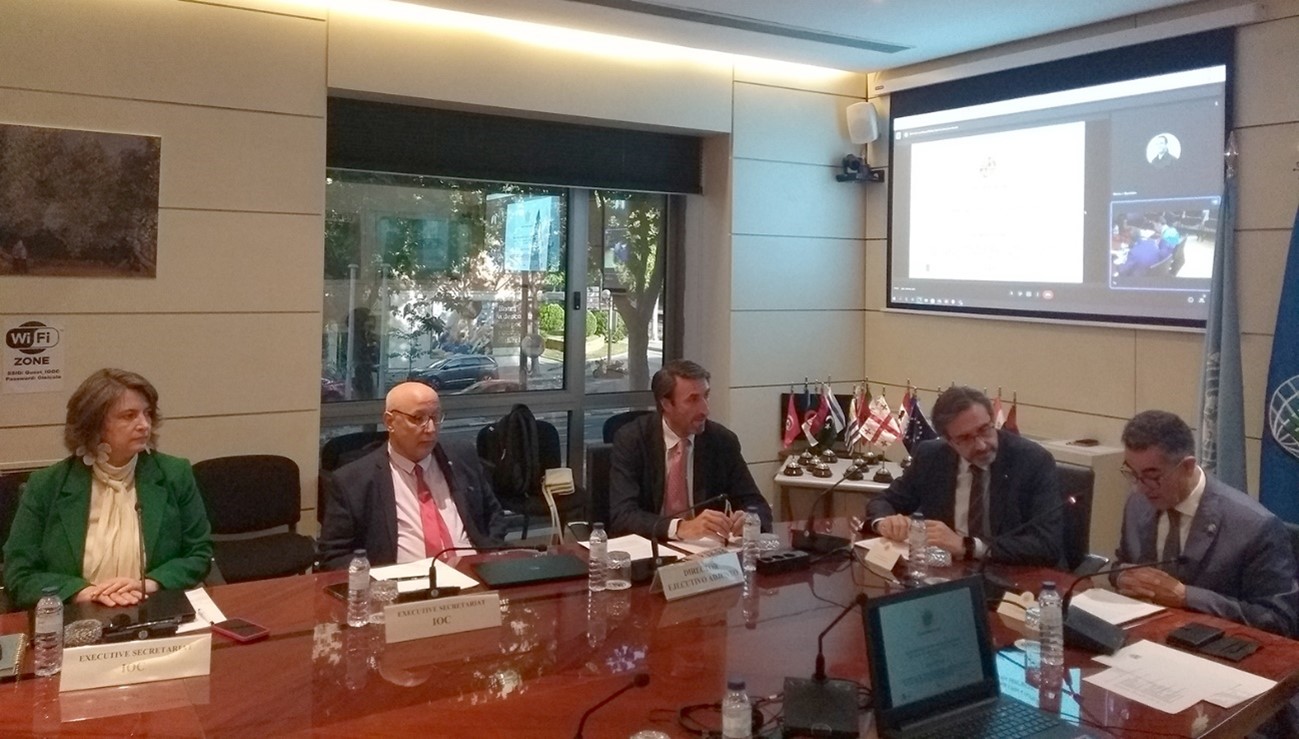The IOC welcomes the University of Jaén and its projects related to the fight against climate change in the olive sector .The IOC hosted representatives from the University of Jaén (UJA) on 24 May 2022 for a new meeting of the OLEA initiative on the fight against climate change in the olive sector.
The OLEA project aims to promote the joint participation of researchers, SMEs, public administrations, universities and institutions in research and innovation projects in the olive sector. This initiative was launched by the Office of International Projects (OFIPI) of the Vice-Rectorate for Research of the UJA.
About 200 people attended the meeting, either virtually or in person at IOC headquarters. Participants came from 30 countries: Albania, Algeria, Australia, Belgium, Brazil, Canada, Croatia, Cyprus, Egypt, Germany, Greece, Honduras, Iran, Israel, Italy, Jordan, Lebanon, Montenegro, Morocco, Palestine, Peru, Portugal, Slovenia, Spain, Tunisia, Turkey, United Kingdom and the United States.
 The conference was part of
The conference was part of  the collaboration agreement signed between the IOC and the UJA in January 2020 and was jointly inaugurated by Rector of the UJA Juan Gómez Ortega and IOC Executive Director Abdellatif Ghedira.
the collaboration agreement signed between the IOC and the UJA in January 2020 and was jointly inaugurated by Rector of the UJA Juan Gómez Ortega and IOC Executive Director Abdellatif Ghedira.
The IOC was also represented by its Deputy Executive Director, Jaime Lillo López; the Head of the Olive Growing, Olive Oil Technology and Environment Unit, Lhassane Sikaoui; and the Head of the Technical Cooperation and Training Department, Catarina Bairrão Balula. The Head of the Olive Oil and Environment Department, Pablo Morello Parra, followed the conference online.
The UJA was represented by Gustavo A. Reyes del Paso, Vice-Rector for Research; Juan Bautista Barroso Albarracín, Director of the University Institute for Research on Olive Oil and Olive Oils; and Nieves Muñoz García, Coordinator of the OLEA initiative.
Many experts were also present, including members of CIEMAT (Centro de Investigaciones Energéticas, Medioambientales y Tecnológicas), CDTI (Centro de Desarrollo Tecnológico Industrial), and the Instituto de Investigación en Ciencias de la Alimentación (CIAL) CSIC – UAM

The purpose of this meeting was to present the results in terms of coordination/participation in international research and development projects on climate change mitigation in the olive sector. The results of the following projects were presented:
- SUSTAINOLIVE: The objective of this project is to improve the sustainability of the olive sector, through the implementation and promotion of a set of innovative sustainable management solutions based on agro-ecological concepts, as well as through the exchange of knowledge and the participation of multiple stakeholders and end-users.
- OLIVARESvivos and OLIVARESvivos+: These initiatives aim to make the olive grove more profitable by recovering its biodiversity and generating olive oils identified and certified by a value-added mark.
- SMART-AGRI-SPORE: This project seeks to develop new intelligent spore-based biopesticides to combat Xylella fastidiosa.
- COMPOLIVE: The objective of this project is to develop a new generation of biocomposites based on olive tree pruning residues for industrial applications, promoting the substitution of non-renewable resources through the design of sustainable wood fibre-based products.
- OLIVEN: This project is dedicated to the search for possibilities to improve the olive oil value chain through adding value to by-products.
- REFFECT AFRICA: This initiative focuses on renewable energy and the efficient use of agri-food waste in Africa.
- ARTOLIO: This project on sustainable artisanal olive growing aims to improve the economic sustainability of micro, small and medium enterprises in the Mediterranean olive sector and to increase both the yield and quality of olive oil, by appointing regional local knowledge institutions as mentors, as well as a pan-Mediterranean platform to assist local producers in marketing and sales.
Further information is available on this link: https://youtu.be/DSDaKvVQubE











